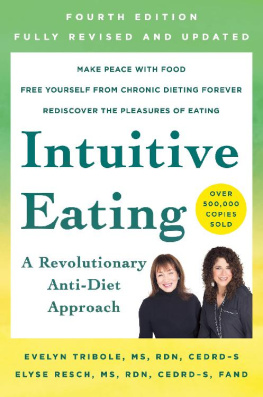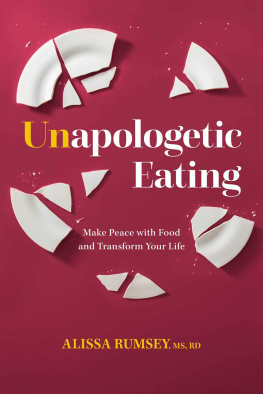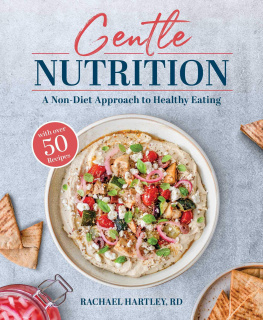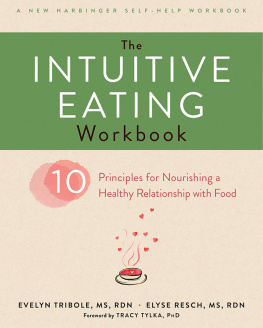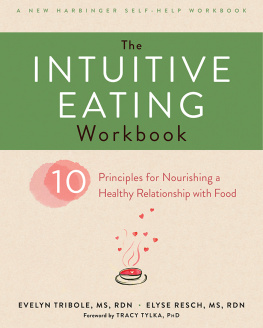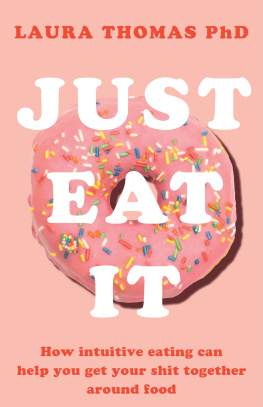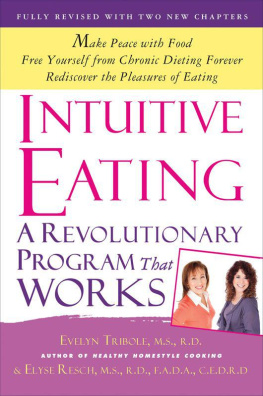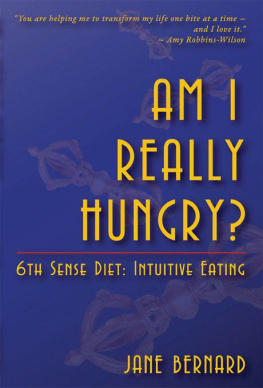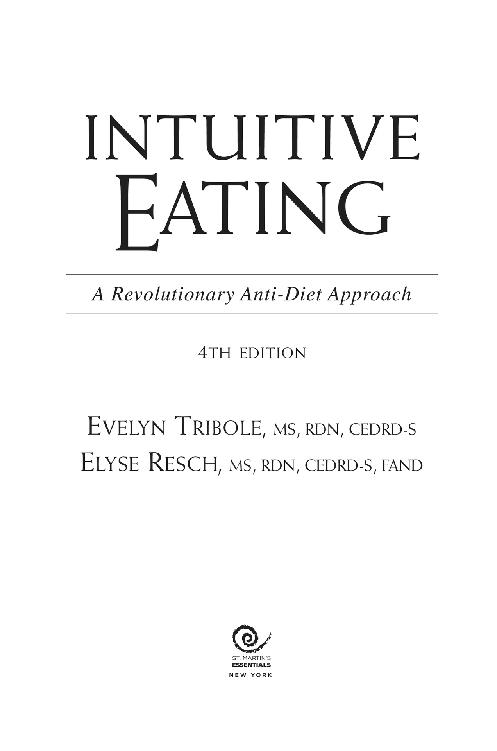Thank you for buying this
St. Martins Press ebook.
To receive special offers, bonus content,
and info on new releases and other great reads,
sign up for our newsletters.
Or visit us online at
us.macmillan.com/newslettersignup
For email updates on Evelyn Tribole, click here.
For email updates on Elyse Resch, click here.
The author and publisher have provided this e-book to you for your personal use only. You may not make this e-book publicly available in any way. Copyright infringement is against the law. If you believe the copy of this e-book you are reading infringes on the authors copyright, please notify the publisher at: us.macmillanusa.com/piracy .
We dedicate this book to our past and present clients and future Intuitive Eaters, and to the health professionals doing this work:
May you have dignity, health, and happinessregardless of your body size or shape.
May you never doubt your inner wisdom or experiences.
We are grateful to many people, including, but not limited to the following:
David Hale Smith, Inkwell Management, LLC, our agent, for championing our work from the very beginning, and his associate, Naomi Eisenbeiss, for her swift attention to detail.
Jennifer Weis, former editor of St. Martins Press, for her enthusiastic vision, and the editorial team for their guidance, especially Sallie Lotz, Assistant Editor, St. Martins Publishing Group.
Tracy Tylka, PhD, for validating Intuitive Eating through her seminal research and creating the Intuitive Eating Assessment Scales.
Deb Burgard, PhD, FAED, for her critical and compassionate feedback.
The following researchers for sharing their tools and insight:
Kristin Neff, PhD, Lindo Bacon, PhD, Carl Lavie, MD, Catherine Cook-Cottone, PhD, Janet Polivy, PhD, and C. Peter Herman, PhD, Ellen Satter, MS, RDN, MSSW, Susie Ohrbach, Jane Hirschmann, PhD, and Carol Munter, Laurel Mellin, PhD, Rachel Calgero, PhD, Diane Neumark-Sztainer, PhD, MPH, RD, Traci Mann, PhD, Leann Birch, PhD, Cynthia Price, PhD, MA, LMT.
To the following communities for advocating Intuitive Eating:
Health at Every Size, Certified Intuitive Eating Counselors & Facilitators, the Intuitive Eating Online Community, the Instagram #IntuitiveEatingVillage, #IntuitiveEatingOfficial, and the EDRD Pro Community.
Arlene Drake, PhD, LMFT, my wife, for her constant and nurturing support, advice, and patience. (ER)
Daniel P. Brown, PhD, my meditation teacher, for his insight and guidance. (ET)
Ellen Ledley, LCSW, my therapist, for her wisdom and understanding. (ER)
Chrissy Roletter for her marketing vision to help spread the word on Intuitive Eating. (ET)
Karen Freeman, MS, RDN, CSSD, my dearest friend, for a lifetime of support, especially during this project. (ER)
Ryan Seay, PhD, and Lisa Du Breuil, LICSW, for their wise counsel. (ET)
Shazi Shabatian, MS, RDN (Associate) and the members of the professional group I supervise, for their input and encouragement. (ER)
Samantha Mullen for her reliable support with all Intuitive Eating projects and Greta Jarvis, MS, for helping with social media. (ET)
To our family and friends, whose unselfish understanding gave us the freedom to complete this book.
And lastly, to the outstanding Intuitive Eating professionals who are carrying on the torch of our work to generations to come.
This [the brains] integrative function illuminates how reasoning, once thought to be a purely logical mode of thinking, is in fact, dependent on the nonrational processing of our bodies.
Daniel Siegel, M.D., Mindsight, 2010
Intuitive Eating was originally published in 1995. Over the years, hundreds of thousands of people have read this book. While reading it, they have had a sense, at a gut level, of getting it. Weve gotten many letters and emails saying youre writing about me, or how did you know I felt this way, or finally someone gets it. Just as so many have gotten itthere are others who have asked what Intuitive Eating really means. Are we just driven by instinct? Do we just know what and how much and when to eat? In introducing this fourth edition, wed like to take this opportunity to be as clear as we can in answering the question of what Intuitive Eating really is.
Knowing a bit about the human brain can help us to understand why were born with all the wisdom we need to be Intuitive Eaters. It can also help us to see how were able to live an Intuitive Eating life, even while being bombarded by the unending choices of natural and refined foods available to us every dayand the relentless diet messages that abound.
Humans are privileged to experience a dynamic interplay of instinct, emotion, and thought, which work together to orchestrate life, and are mediated by the brain. Psychiatrist and mindfulness expert Daniel Siegel, MD, calls this process Mindsight. There are three regions of the brain responsible for this powerful integration.
The first region is called the reptilian brain, because when the early reptiles roamed the Earth, they acted and responded exclusively by instinct. They didnt rationalize or feelthey simply went for it. As life evolved, another level of brain function developed, called the limbic brain, which mammals also possess. Emotions and social behaviors originate here. In the limbic brain, feelings are layered upon the instincts of the reptilian brain. The instincts originating from the reptilian brain are sent to the limbic brain, which serves to expand awareness (Levine 1997). Eventually, the third key region of the brain, called the rational brain, or the neo-cortex, evolved. The rational brain integrates instincts and feelings from the other two brain regions. The rational brain does not control instinctsinstead, it perceives the instinctual and feeling parts of our beings and reflects upon them. The rational brain creates thoughts and language.
Intuitive Eating embraces all three parts of the human brain. In infancy and toddlerhood, eating is mostly instinctual. As we grow older, thoughts and feelings often play a part in our decisions about eating. As we often tell our clients, our bodies are not just composed of the tongue and the stomach, but also the mind. We have often heard someone say, I thought that as an Intuitive Eater, I could eat whatever I wanted. So now I eat whatever I want and as much as I want, whenever I feel like it! This comment actually distorts the premise of Intuitive Eating. Yes, make peace with food, and eat what pleases your palate. Yes, give yourself the freedom to eat unconditionally, and eat as much as you need to satisfy your body. But eating whenever you feel like it, without regard to hunger and fullness, might not be a very satisfying experience and might also cause physical discomfort. Attunement with your bodys satiety cues is an important part of this process.
As an Intuitive Eater, you will be honoring your brain, because it is part of your body. As you go through the principles of Intuitive Eating, you will be storing information in the memory files that you create and house in your brain. When you feel hungry, you will need to pull up several of these files while deciding what to eat. You will evaluate how hungry you feel and then think about what foods might satisfy your hunger and your taste buds. You might even go through a series of sensual imaginings of the taste and texture and temperature of different foods. You also may open the file to reflect on past eating experiences. You might ask yourself whether your present eating choice has worked out for you when youve eaten it in the past. Did it sustain you long enough? Did it make your blood sugar crash? Did you end up with indigestion? Or did you thoroughly enjoy the food and want to have it again? Your emotions may also come into play when you have the desire to eat. Might you be upset and craving food to comfort and soothe yourself? Or are you bored and thinking about eating as a distraction? Considering these possibilities might inform your decision of what to eat, or even whether to eat at all.

